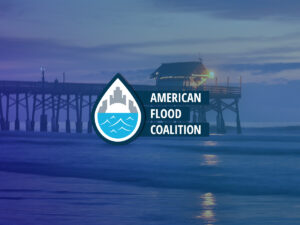The Carolinas and Florida continue to take proactive steps to tackle growing flood risks and strengthen resilience. The three states recently passed significant measures aimed at strengthening their flood resilience and recovery efforts, efforts led by state partners and the American Flood Coalition Action (AFCA), the advocacy arm of the American Flood Coalition.
North Carolina: investments for long-term recovery
AFCA, in collaboration with the Western North Carolina (WNC) Recovery and Resilience Partnership, successfully advocated for Hurricane Helene relief funding that was signed by Gov. Josh Stein after passing both the House and Senate. The funding includes $20 million in grants to support local government flood mitigation projects, a key priority for the WNC Partnership, as local leaders highlighted specific infrastructure vulnerabilities exposed by Helene.
This targeted investment reflects a growing recognition that sustainable recovery must include infrastructure resilience. By addressing immediate needs while planning for the future, North Carolina is taking important steps toward building stronger, more prepared communities.
South Carolina: statewide data and planning
In South Carolina, AFCA partnered with local leaders and legislators on funding and resilience policies critical to the state’s resilience plan that were signed into law by the Governor in the final 2025 state budget. The budget reflects a strong commitment to watershed-based planning and data-driven decision-making, a strategic direction for which AFCA has long advocated.
The budget includes $1 million for expanding the South Carolina Office of Resilience’s (SCOR) data coordination efforts, helping the agency close critical data gaps to strengthen comprehensive planning. In addition, $5 million has been allocated for watershed coordination and planning, enabling SCOR to guide resilience strategies across all eight of the state’s major watersheds.
This planning approach is key to understanding and addressing both upstream and downstream impacts of flooding.
The legislature also committed $40 million to replenish SCOR’s disaster relief and resilience fund, which was significantly drawn down after Hurricane Helene. This investment will support ongoing recovery efforts and help better prepare communities to rebuild with resilience for future disasters.
Florida: Resilient Florida grant funding and flood disclosure
Florida continues to lead in statewide resilience planning with significant progress during the 2024 legislative session. Lawmakers approved $150 million in funding to support the Statewide Flooding and Sea Level Rise Resilience Plan and local resilience planning projects through the Resilient Florida Grant Program. These investments help communities implement forward-looking strategies to address flooding and rising seas.
The legislature also reauthorized the Resilient Florida Trust Fund, reinforcing Florida’s commitment to stable, long-term funding for flood mitigation and resilience infrastructure. This reauthorization ensures continued support for local governments developing projects that reduce risk and protect critical infrastructure.
In a major step for transparency and preparedness, Florida also passed new flood disclosure requirements for renters and mobile homes. Expanding the existing flood disclosure law, home sellers and now landlords must disclose whether a property has previously flooded or if they received any financial assistance for flood damage. This provision gives homebuyers and renters critical information to make informed decisions about their flood risk.
A commitment to resilience
Together, these investments signal a powerful recognition of the urgent need for statewide flood resilience in the Carolinas and Florida. AFCA and its partners have been instrumental in helping shape these outcomes, emphasizing not just the cost of disasters but the opportunity to rebuild smarter.
As communities across the Southeast continue to recover from recent hurricanes and prepare for future storms, these legislative steps will ensure communities are better prepared for flooding.




